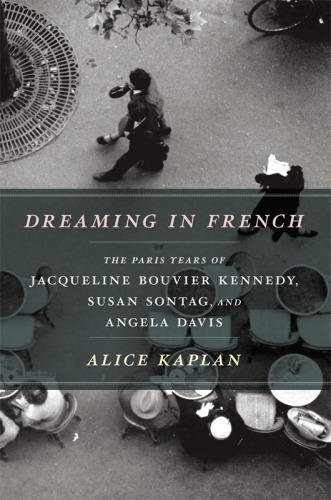
Dreaming in French
The Paris Years of Jacqueline Bouvier Kennedy, Susan Sontag, and Angela Davis: The Paris Years of Jacqueline Bouvier Kennedy, Susan Sontag, and Angela Davis
کتاب های مرتبط
- اطلاعات
- نقد و بررسی
- دیدگاه کاربران
نقد و بررسی

Starred review from February 6, 2012
This is an enduring group profile of three influential yet completely different American women, for each of whom Paris played a short but transformative role, over three tumultuous decades. Jacqueline Bouvier—who would become Vogue’s It Girl and then, in Kaplan’s words, “the eternal First Lady”—found in 1949 Paris the aesthetics, pleasures, and discipline that would serve her all her life. In 1957, Susan Sontag hit the Parisian ground running from her husband and five-year-old son in America to imbibe the freedoms of Europe. On hand during the breakdown of the old colonial dispensation, Sontag would even be buried in Paris. Angela Davis, like Miss Bouvier, traveled with a student group. In a French resort shortly before reaching Paris, on a late-summer day in 1963, she learned of the Baptist Church bombing in Birmingham, Ala., her hometown. Her ever-increasing radicalization back in the U.S. was applauded by myriad French intellectuals. The much-admired Kaplan (French Lessons: A Memoir) focuses sharply on three women of successive generations, providing a keen feminist-cultural picture of Paris’s enduring, if varied, impact. 27 b&w photos. Agent: Marly Rusoff Agency.

April 1, 2012
Each of the women profiled in this book spent time abroad in France, and Kaplan (John M. Musser Professor of French, Yale; French Lessons: A Memoir) aims to demonstrate the reciprocal effects that student and place can have on each other. Although she never specifically explains why she chose to write about these particular women, she notes that each of their experiences helps to illuminate a moment in French or U.S. history: Jacqueline Bouvier's junior year (1949-50) at Vassar took her on one of the first post-World War II student-abroad programs; Susan Sontag arrived in Paris in the late 1950s for postgraduate work as France grappled with the Algerian independence movement; Angela Davis was the sole black student in her study-abroad cohort in the early 1960s, while the U.S. civil rights movement gained momentum. Kaplan follows each section covering one woman's French year with a chapter titled "The Return," describing the long-term impact that French culture had on the woman in question. She relies as much as possible on the women's own words to detail their experiences, filling in with compatriot students' diaries, letters, and interviews as necessary. VERDICT Sure to be popular with both academic and leisure readers. Recommended for its interesting perspective on three important women.--Heidi Senior, Univ. of Portland Lib., OR
Copyright 2012 Library Journal, LLC Used with permission.

Starred review from April 1, 2012
Kaplan (The Interpreter, 2005) recounted her revelatory passion for all things French in French Lessons (1994). She now offers uniquely discerning portraits of three very different yet equally trailblazing American women whose lives were transformed by a year in France, and who, in turn, transformed the United States. An elegant, socially well-connected book lover and keen observer of beauty, Jackie Bouvier Kennedy was a Vassar student when she went to France in 1949 and found her true home. As Kaplan follows Kennedy to the White House and beyond, she praises her quiet power and uncanny intelligence while tracking her lifelong fascination with French art and culture. Leaving her husband and young son behind, Susan Sontag landed in France in 1958 and immersed herself in bohemian Paris and the French literary works that became the foundation for her influential, often controversial writing. Angela Davis' ardor for French propelled her out of segregated Birmingham, Alabama, to school in New York, then to Paris in 196364 as the only African American student in her year-abroad program. A woman of intellectual intensity and valor, she became a besieged activist and cause celebre. Kaplan's avidly researched, fresh, and astute biographical triptych reveals as much about the evolution of women's lives as it does about how profoundly these three exceptional Francophiles deepened the American experience.(Reprinted with permission of Booklist, copyright 2012, American Library Association.)

























دیدگاه کاربران